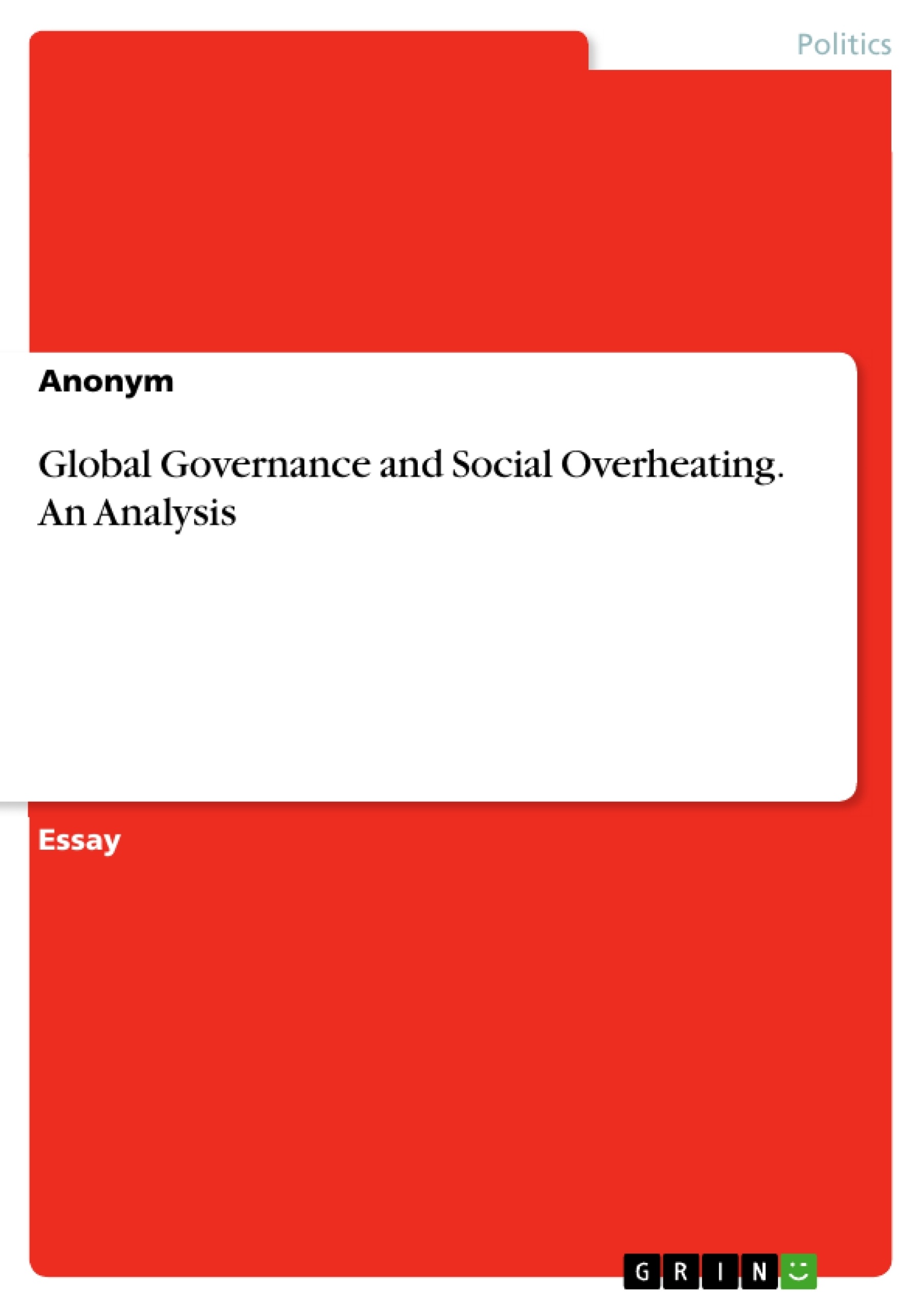This paper analyzes the topic of Global Governance and Social Overheating. The rise of globalisation has led to faster but more superficial connections and interactions between people and countries. The pressure on global governance is linked to a number of factors, including the decline in the power of non-state organisations, the increase in various flows across borders, including negative phenomena such as drugs or diseases, the aggressive behaviour of states or their powerlessness to find solutions to global problems.
The current globalisation competition aims to make the world a small village, bridging the long-standing distance gap. One of the areas in which globalisation can negatively affects nations, is to increase tension, fear and discrimination - what we might call social overheating. The world continues to evolve at a faster pace, which has led to various innovations with harnessing artificial
intelligence to lead the way.
Inhaltsverzeichnis (Table of Contents)
- GLOBAL GOVERNANCE
- SOCIAL OVERHEATING
Zielsetzung und Themenschwerpunkte (Objectives and Key Themes)
This text explores the multifaceted impact of globalization on global governance and societal dynamics. It examines the pressures and challenges associated with global governance in a world characterized by interconnectedness and complex interactions between states and non-state actors. The text also delves into the concept of "social overheating," analyzing the rising tensions and anxieties within societies as a consequence of globalization's rapid pace of change and its uneven effects.
- The rise of global governance and its necessity in addressing challenges of globalization.
- The factors contributing to the need for global governance, including the diminishing power of individual states, increased flows across borders, and the inability of states to address global problems independently.
- The potential negative consequences of globalization, including social overheating, cultural clashes, and political instability.
- The importance of addressing income inequality, promoting cultural tolerance, and fostering political stability to mitigate the negative effects of globalization.
- The need for a holistic and inclusive approach to globalization, recognizing both its positive and negative impacts and working towards a more sustainable and equitable model.
Zusammenfassung der Kapitel (Chapter Summaries)
GLOBAL GOVERNANCE
This chapter examines the rise of global governance as a response to the challenges posed by globalization. It highlights the diminishing power of individual states and the increasing importance of international cooperation in addressing global problems. The chapter discusses various factors contributing to the need for global governance, including the rise of non-state actors, increased flows across borders, and the inability of states to effectively deal with issues like climate change, poverty, and unfair treatment. The chapter argues that global governance is essential for providing a framework for effective cooperation between different countries and international organizations.
SOCIAL OVERHEATING
This chapter focuses on the concept of "social overheating," which refers to the rising tensions, anxieties, and conflicts within societies as a consequence of globalization. It examines various factors contributing to social overheating, including the rapid pace of technological innovation, cultural clashes, income inequality, and political instability. The chapter highlights the challenges of balancing globalization's positive aspects with its negative effects on social cohesion and world peace. It emphasizes the need for addressing issues of income inequality, promoting cultural tolerance, and fostering political stability to mitigate the potential risks associated with social overheating.
Schlüsselwörter (Keywords)
The main keywords and focus topics of this text include: global governance, globalization, social overheating, international cooperation, state power, non-state actors, global problems, cultural clashes, income inequality, political instability, social cohesion, world peace, cultural tolerance, sustainable development, inclusive globalization.
Frequently Asked Questions
What is "social overheating" in the context of globalization?
Social overheating refers to the rising tensions, anxieties, discrimination, and conflicts within societies caused by the rapid pace of globalization and technological change.
Why is global governance necessary today?
It is necessary because individual states often lack the power to solve global problems like climate change, poverty, or transnational diseases independently.
What factors put pressure on global governance?
Pressures include the decline in power of non-state organizations, increased illegal flows across borders (like drugs), and aggressive state behavior.
How does globalization affect cultural relations?
While it connects people, it can also lead to cultural clashes and increased discrimination if not managed through tolerance and inclusive policies.
What role does AI play in this evolution?
Artificial intelligence is leading the way in various innovations that accelerate the pace of global change, contributing further to societal dynamics and interconnectedness.
- Citar trabajo
- Anonym (Autor), 2023, Global Governance and Social Overheating. An Analysis, Múnich, GRIN Verlag, https://www.grin.com/document/1385643



